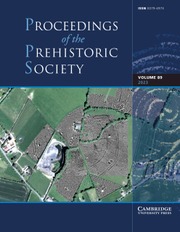Article contents
Studies in the Palaeolithic Succession in England, No. III: Palaeoliths from St. Neots, Huntingdonshire
Published online by Cambridge University Press: 27 May 2014
Extract
Palaeolithic artifacts were recorded from a terrace on the Great Ouse, near St. Neots, Huntingdonshire, in 1927, the chief source being a group of pits dug in what was formerly part of Paxton Park, on the left bank of the river in the parish of Little Paxton. Mr Tebbutt has since recovered many more artifacts from this site. Taken together, the material constitutes a working industry, which will be described in this paper.

A twelve-foot section, fig. 1, shows a basal layer (1) of boulders and large pebbles resting upon undisturbed Oxford Clay. One boulder of limestone measured two feet in length, and many other erratics showed the derivation of this layer from drift deposits of a preceding glacial stage. Bones and teeth of Elephas primigenius, Rhinoceros antiquitatis, Rangifer tarandus, and Equus caballus were found here. This basal bed is not a solifluxion level in place, though it may represent a solifluxion layer which has been re-washed and sorted. Certainly the Oxford Clay has not been caught up into it, and the elements are uniformly water-laid, passing up, without break, into nine feet of compact, well-bedded, fluviatile gravels.
- Type
- Research Article
- Information
- Copyright
- Copyright © The Prehistoric Society 1947
References
page 37 note 1 Tebbutt, C. F., with Marr, J. E. and Burkitt, M. C., Proc. Prehist. Soc. E. Anglia, V, 166Google Scholar.
page 38 note 1 Ibid., 168.
page 38 note 2 Ibid.
page 38 note 3 See Proc. Prehist. Soc., 1945, 8Google Scholar, footnote.
page 41 note 1 In most literature on the Acheulian, this end, away from the pointed extremity, is called the ‘butt,’ since it represents the handled portion of the presumed hand-axe, contrasting with the functional part, the point.
page 41 note 2 Proc. Prehist. Soc., 1940, 13Google Scholar, fig. 9.
page 45 note 1 Paterson, T. T., Proc. Prehist. Soc., 1945, 1et seq.Google Scholar
page 45 note 2 loc. cit., 1927, 172, pl. III G.
page 45 note 3 Leakey, L. S. B., Adam's Ancestors (Methuen, 1934), 129et seq.Google Scholar
page 46 note 1 Sainty, J. E. and Watson, A. Q., Norfolk and Norwich Archaeological Soc., XXVIII, 1945, 183–6Google Scholar.
page 46 note 2 Proc. Prehist. Soc., 1940, 169Google Scholar.
page 46 note 3 Also in South India.
- 9
- Cited by


